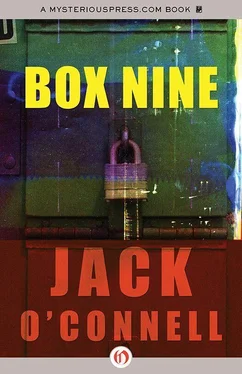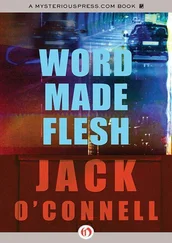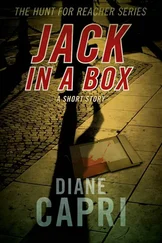Maybe it’s nothing like that. He’s breathing easily, not making any noise. Maybe it’s some simple pastoral dream from his grand-father’s narrated past. Something about rice paddies or the slow lapping sound of water against the sides of a sturdy junk bobbing near a shore, riding out the mild, endless waves of the family village. Maybe she should wake him suddenly and ask him, demand that he spit out his imagery before it fades. Interrogate him for every detail he can save from the deteriorating land of REM sleep.
Lenore’s own dreams were horrible and she’s grateful to be awake. The first thing she did after opening her eyes and getting a bearing on her surroundings was to pull a hit of crank from her pocket and pop it. There’s no water available, so she had to swallow it dry. It went down hard and her throat still aches.
But she’s happy to be awake and even this filthy basement is better than what she went through in the nightmare: She was the sole passenger on this endless subway ride. The subway car was this broken-down bullet, windowless, graffiti-covered, floors filled, for some reason, with old, yellowed, crumpled-up newspapers. The graffiti was in either code or some new inner-city slang or an obscure foreign language, but there were crudely drawn illustrations next to it that gave her an idea of its meaning. Like some subterranean Rosetta stone. Both the forward and rear doors were jammed shut. Every now and then the lights would go out and she’d sit in the darkness for what seemed like an hour. The car seemed to be gradually but consistently picking up speed. Her feet vibrated on the floor and her hands, gripping the edge of her seat, began to shake. There was an awful and incessant electric-sounding hum in her ear. At one point she panicked and ripped open her coat to look for her gun, but her holster was empty. Cold air began to fill the car. Every now and then she moved to the front and back doors and yelled, first calling out full sentences like Is anyone down there? or Can anyone stop this thing? Then she shortened to calls for Help , and finally, just before giving up, she made guttural, animal noises, howls and barks. She collapsed back onto the cream-colored molded plastic bench and began to imagine the cinematic possibility that some bomb had fallen and decimated the city. That the radiation had seeped into the tunnels and killed the driver, the only other person in the subway, in this terrible strangulating manner. She fell sideways on the bench, curled into a fetal hunch, and wondered which would be worse — to be choked out in the near future by the radiation making its way toward her, car by car, or to be immune to the radiation and live, trapped on this perpetually moving vehicle, circle the city over and over, until dehydration alone turned her car into a mobile grave. She could probably have hurled herself out of one of the shattered windows and under the wheels, but suicide was out of the question for more than one reason. As she crowded in further on her own body, the hum in her ears increased until it became painful. She woke from the dream with her hands at the sides of her head.
She and Woo are in the basement of the Sapir Street Postal Station. Miskewitz, through Mayor Welby, had the postmaster let them in during the night so they could get in position and set up operations before any of the mail carriers, or even the branch supervisor, knew of police presence below their feet.
They brought with them two sleeping bags, a bag of convenience store food — potato chips, candy bars, packaged donuts — a double thermos of coffee, and all the electronics needed to listen to and tape any phone calls coming into or leaving the Bach Room. At 2 A.M., Miskewitz had a lineman setting the tap on the pole behind the bar. Lenore and Woo moved into the basement just before four.
Now Lenore is kicking herself for not bringing something to read. Woo brought a small paperback, without any cover illustrations, titled Aztec Tongue in big white block letters. She’d like to ask him if it’s fiction or some difficult textbook but she knows she won’t. She hasn’t given any thought to the question of why she allowed this dorkwhite, whom she doesn’t even like, to unbutton her blouse, control the situation. The fact that she didn’t set an initial, unforgettable example — inflict some physical punishment, draw a little nose blood — bothers her tremendously. Had it been Zarelli, his index finger would be in a splint right now and he’d be explaining to the wife and the lieutenant how he slammed his desk drawer on it.
She’s set things up in a tiny alcove at the back of the basement, away from the sidewalk-level windows covered with black wire grilles. There’s a small semi-room, set off from the rest of the cellar by two brick partitions, housing the old furnace, the water main, and the electrical board that’s updated with a box of circuit breakers. Lenore and Woo pulled an abandoned worktable into the alcove, dusted it off, and placed on it the receiver and tape machine.
Though the alcove is much roomier than the inside of the Barracuda, Lenore would much rather be in her car. She feels slightly claustrophobic in the cellar and she hates the thought of breathing in years of dust and soot. The idea of rodents doesn’t thrill her, but it’s below the cooped-up feeling on the list of things that annoy her. Ike, she thinks, would probably love it here, secluded, forgotten, dim, an extreme version of his side of the duplex. Ike dislikes bright lights, and, she suspects, has some latent agoraphobia brewing in his psyche. They’re exact opposites in this regard and she wonders if anyone has done a study of this in twins. We’re dizygotic , she thinks, two different eggs , and then she envisions herself and Ike as small grey rectangular magnets. Turned one way, they repel away from one another. Ends reversed, they slide together helplessly and mesh. She considers the fact that some days she dwells for hours on Ike’s lack of a girlfriend and considers women that she could introduce him to. Other days, she knows, his singleness pleases her and she wants him to stay forever alone, on the opposite side of her walls.
She’s dressed in her oldest black jeans, a teal cotton turtleneck over a light-thermal undershirt, black Reeboks, and a secondhand leather bomber jacket that she bought off a Cambodian with an eye patch at the refugee flea market one Sunday morning. The market was set up weekly out at the old train lot on Ironhouse Ave. It wasn’t until she got the jacket home that she found a small 3 x 5-inch drugstore notebook in the breast pocket. The notebook contained only three pages, all the others had been torn out. The pages were filled with foreign writing, Oriental-like, and from the way it was set on the page she guessed that it might be poetry. She debated for three weeks whether or not she should return it to the merchant. Her biggest argument against its return was her reasoning that he was just a salesman, just a broker, that he’d gotten it elsewhere and the notebook didn’t belong to him any more than her. She never discussed what to do with anyone. Not Zarelli, not even Ike. After a month, she went back one Sunday morning to the flea market and managed to locate the booth where she’d gotten the jacket. But the Cambodian with the eye patch was gone. In his place was a Nicaraguan selling old eight-track tapes. She purchased Vic Damone’s Greatest Hits for a quarter and gave it to Zarelli at work the next day. Zarelli shrugged and said, “He’s not Tony B, but he’s okay.”
She wishes she’d brought the notebook with her to the cellar. Most likely, Woo could translate it for her. Then she changes her mind and is pleased she didn’t think to bring it. Whatever her imagination has made those obscure symbols into would be wiped out the second Woo opened his mouth and changed them into English.
Читать дальше












